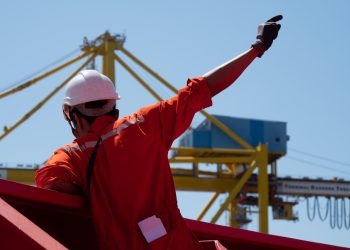The FIT Alliance, formed by BIMCO, DCSA, FIATA, ICC and SWIFT, issued a survey in June 2022 to gauge awareness and adoption of electronic bills of lading (eBLs), as well as factors that hinder adoption.
The survey results show some promise for growth in eBL use but clearly identify obstacles that the industry must address for eBLs to gain mainstream acceptance.
How widespread is electronic bill of lading use?
Awareness of eBLs is high – three out of four respondents have heard at least some (up to a great deal) about them, and 94% have heard at least a little. A closer look at the numbers reveals that 28% of respondents already use eBLs in conjunction with paper.
The task now becomes to accelerate adoption by this group, so they can join the 5% who have already made the full transition to eBL. Fortunately, a majority (58%) of those using only paper B/Ls report their organisations have plans to use eBLs in the future, but only just over a fifth (22%) say this will be within the next six to 24 months.
The advantages of digitisation are also well known. When asked what could be achieved through eBLs and wider trade digitisation, an overwhelming 86% of survey respondents identified increased speed, while 78% cited process efficiencies, 73% improved customer experience, and the same percentage, cost savings. Nearly nine in ten respondents (86%) said they believe eBLs can/will unlock wider trade digitisation.
What hinders electronic bill of lading adoption?
To close the gap between what respondents think eBLs can deliver and their actual usage of them, the industry must address the key factors that hinder adoption, which were also identified in the survey.
Concerns about technology, platform and lack of interoperability
The top reasons for not using eBLs, or not using them more, can be grouped as:
- Technology
- Platform
- Interoperability concerns.
These concerns were cited by almost three-quarters (73%) of respondents. Whilst the concerns pointed to different factors such as the need for more education about the security and technology aspects, platform choices or costs, they illustrated that organisations are hesitant to move forward because they do not want to “choose wrong” on eBL solutions.
Although there are currently seven well-established eBL platforms in the industry, each one is a “walled garden”, with its own proprietary technology and bylaws that govern the relationships between the stakeholders involved in a transaction.
What this means in practice is that parties that want to exchange an eBL must all subscribe to the same platform. If the shipper uses platform A, the consignee platform B, the trade finance bank platform C and the carrier platform D, they cannot use an eBL, as it cannot be transferred between different platforms
said DCSA.
Insufficient adoption by other stakeholders
Since an eBL must flow through the hands of many stakeholders, a hurdle to eBL adoption is insufficient adoption by other stakeholders in the ecosystem. A majority (63%) of our survey respondents cited lack of stakeholder readiness as a key reason for not using eBLs, or not using them more, making it the second most cited reason.
The solution to this standoff is simply for companies to embrace standardisation by actively contributing to and driving standards implementation within their own organisations.
When asked what the most important advantages of eBLs compared to paper BLs are, participants identified increased speed, cost savings from process efficiencies, and improved data accuracy due to the elimination of manual data input.
At a global economic growth rate of 2.4% through 2030, DCSA estimates the container shipping industry could potentially save more than $4 billion per year with 50% eBL adoption.
Legal acceptance of the electronic bill of lading
Legal gaps were the third most cited reason for not using eBLs, selected by 55% of survey respondents. The United Nations Commission on International Trade Law (UNCITRAL) Model Law on Electronic Transferable Records (MLETR) offers a legal framework that can be adopted by countries to enable electronic documents to be recognised as legally equivalent to paper documents.
In reality, even though MLETR is not yet widely adopted, it does not pose an obstacle to eBL adoption today. eBL solution providers already have legal frameworks in place to enable eBL adoption and legal interoperability
according to DCSA.
Nonetheless, the world saw a significant and positive boost when the UK government announced its intention to legalise digital trade documentation. The Electronic Trade Documents Bill, currently making its way through UK parliament, will legally recognise digital trade documentation as equivalent to paper by mid-2023.
This paves the way for widespread adoption of eBL for all sectors and industries using English law as a basis for international contracts, which includes 80% of bills of lading, much of world trade and several leading ocean carriers.






























































